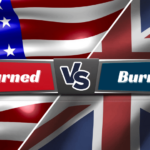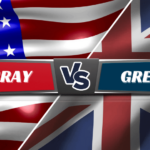English is spoken by over 1 billion people worldwide. In this article, we’ll talk about the differences between British English vs American English. We’ll explore how they use different words, spellings, pronunciations, and grammar rules, showing what makes each style unique.
Vocabulary
In general, most words mean the same thing in British and American English. For example, the words apple and chair refer to the same objects in both versions of English. For the most part, speakers of American English and British English won’t have much trouble at all understanding one another when it comes to vocabulary.
However, there are many examples of the same thing being referred to by different words depending on if you are using American or British English. Here are just a few more examples of two different words being used to refer to the same thing:
| American English | British English |
|---|---|
| French fries / fries | chips |
| cotton candy | candyfloss |
| apartment | flat |
| garbage | rubbish |
| cookie | biscuit |
| green thumb | green fingers |
| parking lot | car park |
| pants | trousers |
| windshield | windscreen |
Spelling
Generally speaking, most English words are spelled the same in American and British English. However, there are some notable spelling patterns that are preferred depending on which form of English is used. Listed below are just some examples of spelling differences you may encounter:
| British English | American English |
|---|---|
| colour | color |
| centre | center |
| theatre | theater |
| catalogue | catalog |
| defence | defense |
| metre | meter |
| lustre | luster |
| programme | program |
| tyre | tire |
| grey | gray |
Pronunciation
The main difference between British English and American English is in pronunciation.
Here are five of the most common differences:
Rhoticity: In American English, the letter “r” is pronounced in most cases, while in British English, it is often silent.
T-glottalization: In American English, the “t” sound is often pronounced as a glottal stop (like the sound in “uh-oh”) when it appears in the middle or at the end of a word. In British English, the “t” sound is usually pronounced as a “t” or “d” sound.
Vowel sounds: There are many differences in vowel sounds between American and British English.
- For example, the “a” sound in “dance” is pronounced differently in American and British English.
Stress: In American English, stress is often placed on the first syllable of a word, while in British English, stress is often placed on the second syllable.
Intonation: The intonation patterns of American and British English are different.
- For example, American English speakers often use a rising intonation at the end of a sentence to indicate a question, while British English speakers often use a falling intonation.
What are the Grammar differences between British and American English?
Grammar differences between British and American English are relatively subtle but noteworthy. Here are a few examples:
- Collective Nouns: In British English, collective nouns like “team” or “government” are often treated as singular, whereas in American English, they can be treated as singular or plural.
- Verb Agreement: British English tends to use the present perfect tense more frequently, while American English may use the simple past tense.
| British English | American English |
|---|---|
| I have just eaten. | I just ate. |
| He has already left. | He already left. |
Quick Tip: To tell if it’s British or American English, just check the spellings with ‘ou’ and ‘or.’ Like “colour” for British and “color” for American, or “favour” for British and “favor” for American. It’s a quick way to know which English you’re looking at!
What are the key differences between British English and American English?
British English and American English differ in vocabulary, spelling, and pronunciation. Examples include words like “biscuit” (cookie) and spelling variations such as “colour” (color). Pronunciation disparities involve rhoticity, T-glottalization, vowel sounds, stress, and intonation patterns.
Conclusion
In conclusion, British and American English are alike in many ways, but they also have differences in words, spelling, and how things are said. Knowing these differences can help you talk better with people from both places. I hope this article helped you see some of the main contrasts between British and American English.


